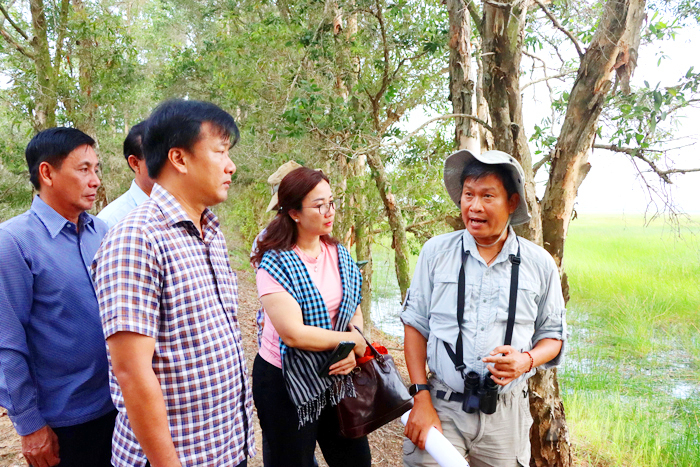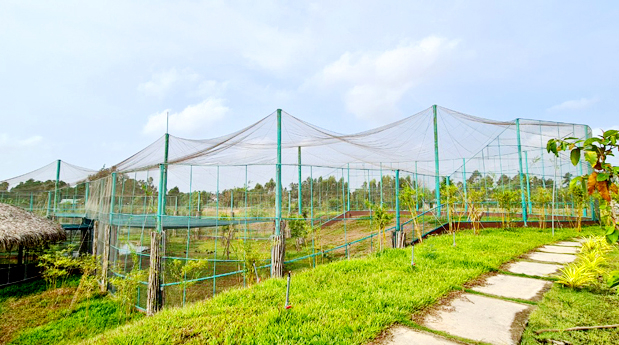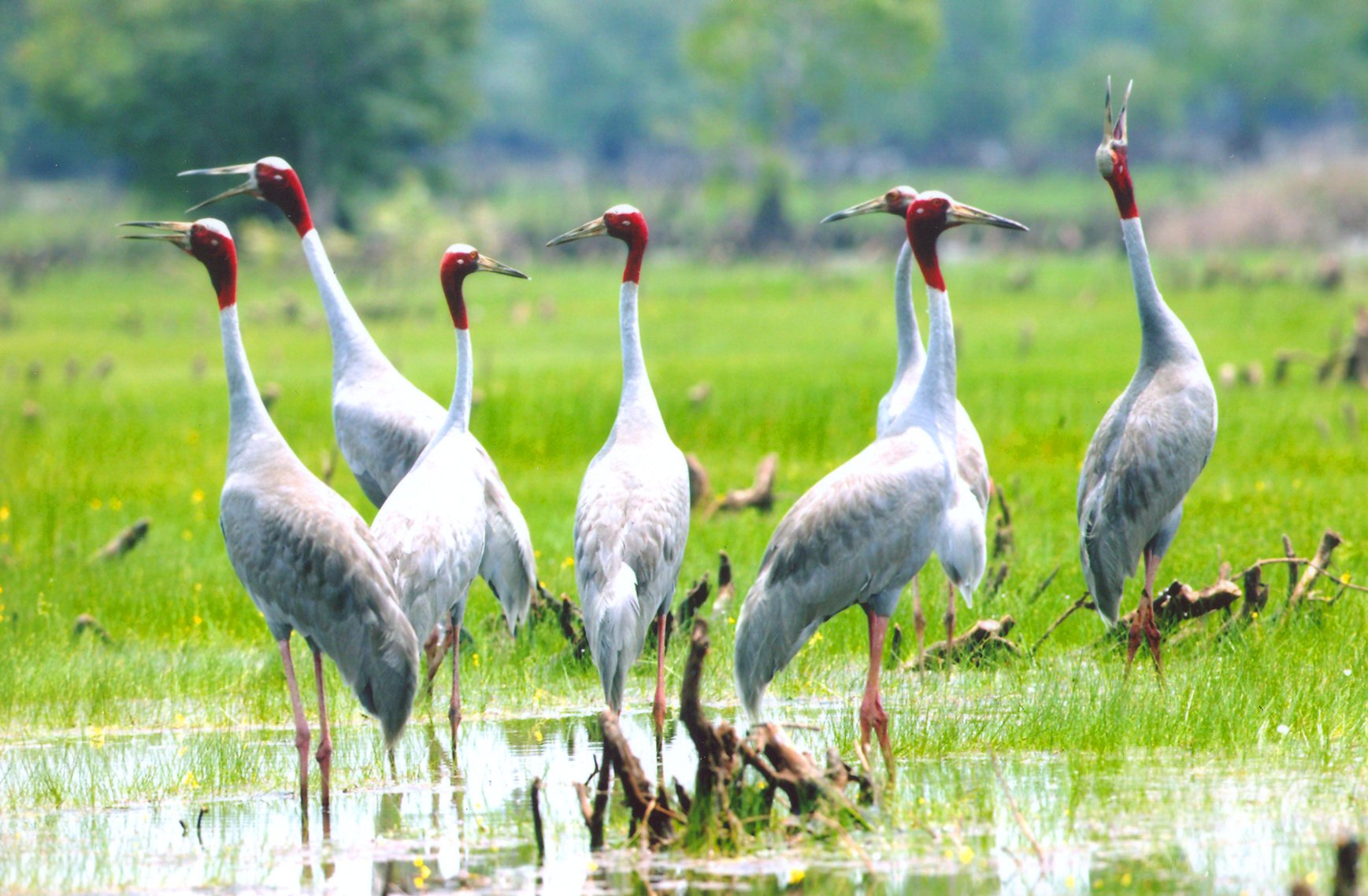June 21, 2025 | 03:48 GMT +7
June 21, 2025 | 03:48 GMT +7
Hotline: 0913.378.918
June 21, 2025 | 03:48 GMT +7
Hotline: 0913.378.918

Mr. Nguyen Phuoc Thien, Vice Chairman of Dong Thap Provincial People's Committee surveying the crane conservation area in Tram Chim National Park. Photo: Le Hoang Vu.
The wild red-crowned crane populations in Vietnam and Cambodia have declined by more than 80% within the last ten years. Accordingly, their populations in both countries fell from 850 recorded individuals in 2010, to less than 160 recorded individuals according to the most recent census in 2022.
As a result, the International Crane Foundation (ICF) and the Vietnam Zoo Association (VZA) will facilitate cooperation between the red-crowned crane population recovery programs in Thailand and Vietnam. Additionally, ICF, VZA and the Zoological Park Organization of Thailand will provide technical assistance and training for Tram Chim National Park in Dong Thap province. Accordingly, the National Park's staffs will receive training on various techniques for raising, releasing, and managing red-crowned cranes in their natural habitat within the park's core and buffer zones.
Depending on demand and ability, the Zoological Park Organization of Thailand will supply baby red-crowned cranes to Tram Chim National Park every year for rearing and release into the wild. This process is subject to national legislation and the Zoological Park Organization of Thailand, as well as the safety of the animals.
Mr. Nguyen Phuoc Thien, Vice Chairman of Dong Thap Provincial People's Committee, Head of the Executive Committee of the Project for Conservation and Development of red-crowned cranes at Tram Chim National Park remarked: "Dong Thap province has always been proud to be recognized as the World's 2,000th Ramsar Site, with a sizable flock of red-crowned cranes. However, due to the impact of climate change, this population has gradually decreased over the years. Dong Thap was very pleased to cooperate with the Zoological Park Organization of Thailand in 2023. Accordingly, the Organization will supply baby red-crowned cranes to Tram Chim National Park every year for rearing and release into the wild".
According to Mr. Thien, after the signing ceremony for the conservation of red-crowned cranes between Dong Thap Provincial People's Committee the International Crane Foundation, the Vietnam Zoo Association, and the Zoological Park Organization of Thailand, Dong Thap is in the process of building a Project for Conservation and Development of red-crowned cranes from 2022 to 2032. Additionally, the project will be developed in association with organic agricultural production in the buffer zone to create a safe living environment for cranes outside the buffer zone. The Project for Conservation and Development of red-crowned cranes will be implemented in Tram Chim National Park and Tam Nong district.

The Project for Conservation and Development of red-crowned cranes from 2022 to 2032 will be developed in association with organic agricultural production in the buffer zone to create a safe living environment for cranes outside the buffer zone. Photo: Le Hoang Vu.
According to the Project, Tram Chim National Park aims to conserve and develop red-crowned cranes by raising and releasing them into the natural environment. Within 10 years from 2023 to 2033, the project expects to stock at least 150 cranes with a minimum of 100 survivors. The released cranes will be able to reproduce and survive on their own in the wild.
The project features 4 main contents: rearing and releasing cranes in Tram Chim National Park; improving the cranes' natural habitat; building organic agricultural production areas around the park; promoting the development of sustainable livelihoods based on cranes and organic agriculture, with the participation of local communities.
Dong Thap is currently designating area A4 of Tram Chim National Park as a location to rear and release cranes into the wild. This area is surrounded by a 1,623-hectare buffer zone, which will house an organic rice production model without using chemical fertilizers.

Dong Thap is currently designating area A4 of Tram Chim National Park as a location to rear and release cranes into the wild. Photo: Le Hoang Vu .
The project will be implemented in 3 phases from 2023 to 2025, with a total area of 200 hectares and a budget of over VND 13.6 billion. Subsequently, 15 households have been encouraged to register for organic rice production on approximately 100 hectares for the 2023 summer-autumn crop. In addition, the organic rice model helps to improve the livelihoods of people in the buffer zone, develop tourism in the National Park, and raise public awareness regarding environmental protection of acacia forests. Furthermore, the project calls for the participation of the local community as well as the private sector.
Dong Thap Provincial People's Committee has requested the local Department of Culture, Sports and Tourism to coordinate with Tram Chim National Park in surveying and rebuilding tourist routes in the National Park. The local government must research and build an image of Tam Nong district in association with the conservation and development of crane tourism", emphasized Mr. Nguyen Phuoc Thien.
Translated by Nguyen Hai Long
![Turning wind and rain into action: [9] Digitizing hydrometeorological data in response to climate change](https://t.ex-cdn.com/nongnghiepmoitruong.vn/608w/files/news/2025/06/17/z6704423696987_15fd32ffc26d590d204d520c9dac6786-nongnghiep-165943.jpg)
(VAN) Farmers have begun accessing hydrometeorological applications to adjust their cropping schedules, aiming to ensure productivity and adapt to climate change.
![Turning wind and rain into action: [8] Real-time salinity detection and early warning technology](https://t.ex-cdn.com/nongnghiepmoitruong.vn/608w/files/news/2025/06/17/z6704423696987_15fd32ffc26d590d204d520c9dac6786-nongnghiep-151127.jpg)
(VAN) Thanks to the integration of modern hydrological-hydraulic models, remote sensing technologies, and artificial intelligence, the accuracy of hydrological forecasting has significantly improved.
![Turning wind and rain into action: [7] Early disaster warnings help marine farmers minimize losses](https://t.ex-cdn.com/nongnghiepmoitruong.vn/608w/files/news/2025/06/17/z6704423696987_15fd32ffc26d590d204d520c9dac6786-nongnghiep-142942.jpg)
(VAN) In recent years, thanks to early disaster warnings and forecasting, marine farmers in Khanh Hoa province have been able to reduce risks and losses, thereby improving production efficiency.
![Turning wind and rain into action: [6] ‘Four on-the-spot’ disaster management software](https://t.ex-cdn.com/nongnghiepmoitruong.vn/608w/files/news/2025/06/17/e5a48259d6a262fc3bb3-nongnghiep-183800.jpg)
(VAN) By simply activating the scenario on the disaster management software, the relevant authorities immediately know how many households need to be evacuated, where to evacuate them to, and by what means of transportation…
![Turning wind and rain into action: [5] Hue applies modern technology in disaster forecasting](https://t.ex-cdn.com/nongnghiepmoitruong.vn/608w/files/news/2025/06/17/z6704423696987_15fd32ffc26d590d204d520c9dac6786-nongnghiep-093938.jpg)
(VAN) In Hue city, modern technology has recently been applied in meteorological and hydrological forecasting and warning, helping to reduce the damage caused by natural disasters.

(VAN) A cutting-edge farming technique being implemented on an experimental ranch in Arizona's Sonoran Desert has already saved a billion gallons of water over five years, according to Civil Eats.

(VAN) Poultry and pig production and the environment can be boosted through enhanced water technology, according to new research.